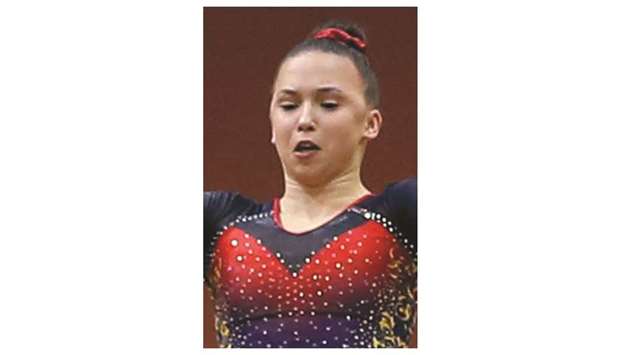Romania’s 13th-place finish in the women’s team qualification competition might not seem like much but for gymnastics lovers everywhere, it was arguably one of the most significant developments of the 2018 World Championships so far.
From Nadia Comaneci to Daniela Silivas and Andreea Raducan to Catalina Ponor, women’s artistic gymnastics is littered with remarkable Romanian gymnasts. In recent times, however, the cupboard has been dispiritingly bare. The team has not won a world championship team medal since 2007 and failed to even qualify for the Rio 2016 Olympic Games.
That was a mighty fall for a nation used to topping Olympic podiums – the women’s team won a medal at every Games from 1972-2012 – and resulted in an intense period of soul-searching.
But in Doha’s Aspire Arena on Sunday, renowned medal-winning coach Nicolae Forminte saw something he liked.
“Today was a nice present from the gymnasts because for the first time they did a big competition without major mistakes,” Forminte said. “This is the moment I have been waiting for and from this moment I think we can re-build. First we had to rebuild trust in ourselves and our capacity to compete.”
Reinstated as head coach of the women’s team in September 2016, five years after quitting the post, Forminte has been battling hard to change attitudes.
“First I needed the support from the gymnasts and I am pleased they understand today how to compete,” he said in Doha. “Then I need more time because in gymnastics you cannot build something easily. I cannot say I have all the support, for Romanians it is very hard to forget the period of glory.
“It is not easy to be at the top and then start again at the beginning. But I love Romanian gymnastics and I do everything I can to help bring it up again.”
Carmen Ghiciuc was part of the group that performed a succession of clean routines in Doha, propelling the team ahead of rivals including Ukraine, Spain, Hungary and the Republic of Korea. She knows the public want more but is adamant they are now on the right path.
“There is pressure on us because lately Romanian gymnastics has not gone so well but we have hope and trust in ourselves,” Ghiciuc said. “We do six or seven hours per day of gymnastics.”
Ghiciuc and her teammates all live, train and study together in Deva, Romania, under the careful eye of their coach and, despite, according to Forminte, a continued lack of serious investment, the set-up is starting to pay dividends.
“We have always done well with very little money,” Forminte said. “We are lucky that our children are very talented in this sport. And there are some coaches like me who do not want to give up.”
The emergence of gymnasts like Denisa Golgota confirms Forminte’s words. The 16-year-old is already the 2018 European Championship silver medallist on Floor and bronze medallist on Vault. Encouragingly, she was not overly delighted with her efforts on Floor on Sunday, despite scoring 13.400 and finishing 11th.
“It could have been much better,” Golgota said. “I am only quite happy.”
Despite not having the numbers – Forminte thinks he will only have eight or nine senior women to work with in 2019 – the coach does think Golgota’s arrival is just the start.
“From 2020 we will be better,” he said. “We have a group of six or seven young juniors who are already on the same level as this group. That is the big hope for me, if we can qualify the team for the Olympic Games then for sure by 2020 the Romanian team looks much better.”

Carmen Ghiciuc of Romania performed a succession of clean routines in Doha.
